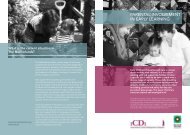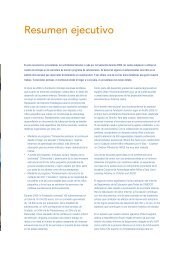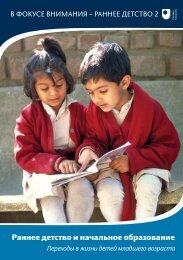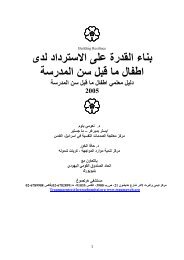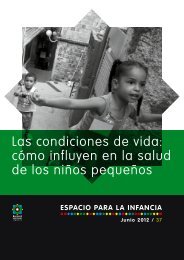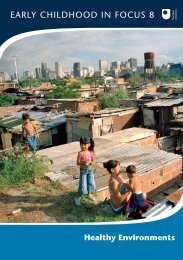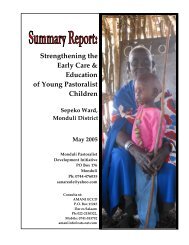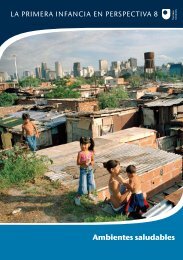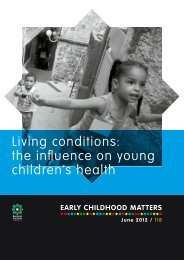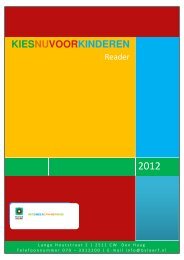Report - Bernard van Leer Foundation
Report - Bernard van Leer Foundation
Report - Bernard van Leer Foundation
Create successful ePaper yourself
Turn your PDF publications into a flip-book with our unique Google optimized e-Paper software.
Appendix 3Education For All (EFA)Goal No. 1: Early Childhood Care & EducationThe Government of the United Republic of Tanzania participated in and committed to …The Dakar Framework for Action:Education for All: Meeting our Collective Commitments. April 2000.We hereby collectively commit ourselves to the attainment of the following goals:-1. expanding and improving comprehensive early childhood care and education,especially for the most vulnerable and disad<strong>van</strong>taged children;2. ensuring that by 2015 all children, particularly girls, children in difficultcircumstances and those belonging to ethnic minorities, have access to and completefree and compulsory primary education of good quality;3. ensuring that the learning needs of all young people and adults are met throughequitable access to appropriate learning and life skills programmes;4. achieving a 50 per cent improvement in levels of adult literacy by 2015, especiallyfor women, and equitable access to basic and continuing education for all adults;5. eliminating gender disparities in primary and secondary education by 2005, andachieving gender equality in education by 2015, with a focus on ensuring girls' fulland equal access to and achievement in basic education of good quality;6. improving all aspects of the quality of education and ensuring excellence of all sothat recognized and measurable learning outcomes are achieved by all, especially inliteracy, numeracy and essential life skills.EFA Goal No. 1:1. Expanding and improving comprehensive early childhood care and education, especially for themost vulnerable and disad<strong>van</strong>taged children30. All young children must be nurtured in safe and caring environments that allow them to become healthy,alert, and secure and be able to learn. The past decade has provided more evidence that good quality earlychildhood care and education, both in families and in more structured programmes, have a positive impact on thesurvival, growth, development and learning potential of children. Such programmes should be comprehensive,focusing on all of the child's needs and encompassing health, nutrition and hygiene as well as cognitive andpsycho-social development. They should be provided in the child's mother tongue and help to identify and enrichthe care and education of children with special needs. Partnerships between governments, NGOs, communitiesand families can help ensure the provision of good care and education for children, especially for those mostdisad<strong>van</strong>taged, through activities centred on the child, focused on the family, based within the community andsupported by national, multi-sectoral policies and adequate resources.31. Governments across rele<strong>van</strong>t ministries, have the primary responsibility for formulating early childhood careand education policies within the context of national EFA plans, mobilizing political and popular support, andpromoting flexible, adaptable programmes for young children that are appropriate to their age and not meredownward extensions of formal school systems. The education of parents and other caregivers in better childcare, building on traditional practices, and the systematic use of early childhood indicators are importantelements in achieving this goal.52




